by Jenny Rose | Nov 9, 2017 | Connection & Community, Emotional Intelligence, Shadows
It’s hunting season in Maine. Several days ago a woman was accidentally shot and killed on her own property at 10:30 in the morning by a hunter. We frequently hear shots in the neighborhood, and although we don’t allow hunting on our land, there’s nothing to prevent a hunter wandering in, attracted by the deer, game birds and waterfowl on our 26 acres.
I bought a cheap orange vest I can wear over my coat for my morning walks.
Wearing orange during hunting season is such a simple and obvious safety tactic that I didn’t think twice about doing it, but the first morning I went out with the vest on I discovered a lot of complex feelings about being so visible in the world.

Photo by Andrew Spencer on Unsplash
The first thing I noted was how dangerously exposed I felt. I do not want to be seen by human eyes. I don’t mind if the wildlife sees me, but if they do I’m less likely to see them, so I do my best to move quietly and unobtrusively through the landscape, wearing neutral, natural colors. I stop and sit or lean against a tree for long stretches, hardly moving, watching the river and listening to the woods around me.
The orange vest shrieks, “Look at me! I’m here!” and I hate it. It’s more than just my preference to blend in to backgrounds and maintain protective camouflage. It seems a life-and-death necessity to avoid being seen.
I’ve been aware of my hypervigilance for some time now. I’ve never been comfortable in crowds. If I’m not able to position myself in a corner or with my back to something solid and watch, listen and evaluate, anxiety quickly disables me. I need to know where the exits are in any indoor space.
This is interesting, as I’m fascinated by people, and people watching is one of my favorite activities. I’ve frequently longed to be invisible, to watch and listen freely and leave no trace of my presence. If I could be invisible, I imagine I’d still get overstimulated by noise, activity and technologically-generated energy, but I’d feel safer.
The strength of my feelings as I donned the orange vest begged the question: What happens if somebody sees me? What’s so terrible?
That’s easy. Criticism happens. Judgement, abuse (verbal, emotional, physical), negative feedback happen. If I’m seen doing anything, I’m sure to be doing it wrong (according to the observer, anyway). I’m sure to disappoint. I’m sure to be inadequate or inappropriate. My clothes are wrong. I’m clearly behaving like a slut, going out on my own land in my men’s Carhartt jeans and old boots. My hair is wrong. My choices are wrong. If I’m heading for the northern boundary of our land, I should be walking the southern border. I’m too noisy. I’m in someone’s way. I’m too slow. I’m wasting my time and should be doing something more productive. I’m irresponsible. I’m lazy. I’m selfish. I’m scaring the fish. I’m scaring the birds. I’m scaring the animals. I should be ashamed of myself.
Wow. No wonder I don’t want to be seen. Who knew the perils?
I didn’t know, until my ugly orange vest dredged all this up from my swampy subconscious.
On subsequent mornings, as I’ve walked in my orange vest, I’ve thought about the tension between being seen and avoiding being seen. How can anyone be in the world without being seen, even the most self-effacing of us? Refusing to be seen is refusing any healthy human connection. How do we get hired without being seen, or accepted for college? How do we follow our creativity or passion if we’re afraid to be seen? How do we engage in face-to-face conversation or discussion, or participate in politics or as a volunteer?

Photo by Peter Forster on Unsplash
On the other hand, how much exposure is too much? How can we avoid being seen by the shooter at the concert, in church or in the movie theater? We seem to be gradually becoming more and more captive to the Matrix, which makes us increasingly vulnerable to identity theft, technological sabotage and cyber-based terrorism.
I sometimes feel I carry protecting my privacy too far. I can’t say I regret not being on Facebook and other social media, as I’ve yet to hear about anything there that I need. On the other hand, not having a cell phone in today’s world creates a lot of problems for me. My personal issues with being seen are in the context of much wider social issues about exposure and safety. I don’t have any answers for the wider social problems. I wish I did.
For myself, though, it’s clear I need to address some of my subconscious beliefs about what will inevitably happen if I am seen. I’ve also developed a thicker skin about being criticized and judged. At this point in my life I’m really not much interested in the criticism and judgement of others. What interests me is how I feel about myself. My list of terrors about what happens if I’m seen is decades out of date, and I’ve already survived those consequences many times over. More of the same is boring rather than terrifying.
I’m stuck with my orange vest for several more weeks, and that’s OK. I’ve come to terms with it. In fact, I’m grateful to it, because it exposed some old wounds that needed attention. I’m stepping into plain sight In many ways in my life, this blog being one of the most prominent and challenging. Now I’ll practice walking this land in plain sight as well.
All content on this site ©2017
Jennifer Rose
except where otherwise noted
by Jenny Rose | Sep 28, 2017 | Connection & Community, Emotional Intelligence
When I was pregnant with my first son in 1989, I approached parenthood the way I approach every new endeavor. I read whatever I could get my hands on. I had a shelf of books on pregnancy, labor and delivery, breastfeeding and parenting. Like most parents, I wanted to be the best I could possibly be.
Twenty-five years later that I came across the only book I needed, a simple paperback I’d never heard of or seen, a book never mentioned by health professionals, teachers or anyone else. The book was The Continuum Concept by Jean Liedloff. It only took me a couple of days to read, and I cried through the whole thing. I’ve rarely read a book that so completely captured my private longings and sense of being broken.
By then, of course, it was far too late to apply the information as a parent.
As I embark on the second half of my life, I think about the continuum concept every day. I grieve for us all, victims of rape culture, many of us broken and maimed sexually, physically, mentally and emotionally. Few of us have any idea what a healthy human relationship looks like, and fewer still know how to go about creating and participating in one, or are in fact able to because of the damage current parenting practices and other social norms cause.
My own needs for affectionate, nurturing touch and in-arms experience are chronically unmet and over the years I’ve learned to spend time in water, in the sun, with animals and in nature as substitutes for human contact.
The trees and forests here are nothing like the pine and aspen forests I knew growing up in Colorado. The broadleaf forests in Maine are tall and deep and thick, every layer incredibly rich and complex. The trees are a mix of fruit, evergreen and hardwood such as birch, beech, oak, ash and maple, to name but a few.
Over the months, as I’ve walked this place and made friends with it, I notice a thing about this forest.
The trees die in one another’s arms.
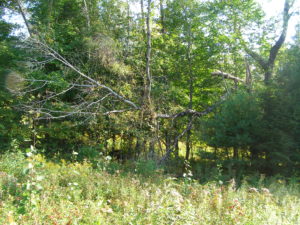
Orchard Field
Trees of all ages grow here. Older, damaged or weak trees begin to lean and die. They can remain standing in death, becoming snags for wildlife and insects, or rot from the inside out and the roots up with the help of fungi and moss. These can be pushed over with one hand, and as they fall they collapse wetly into pieces, releasing the woody smell of mushrooms. Smaller trees can sometimes find a way to fall all the way to the ground, especially at the edges of forested areas or along the river, but the huge old trees away from the edges have no room to fall entirely. They might drop branches or break at various points up the trunk, but the whole tree can’t come down at once.
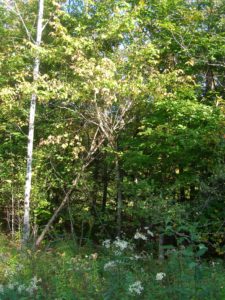
Die in my arms 09/27/17
All over this 26 acres old trees are leaning, dying or dead, held in the arms of their healthy, living neighbors. Some neighbors of the same species are no doubt family members, but it doesn’t matter. A tall, strong ash might hold an old beech, or a maple support the skeleton of a pine.
This is not a dutiful, quick, can’t-wait-to-get-it-over-with embrace, but a years-long in-arms relationship while the dead tree rots and breaks down, feeding its patient supporter and the rest of the forest, until the moment comes when the last of its body decays enough to fully rest on the ground where it was born.
The forest grows together, lives together and dies together.
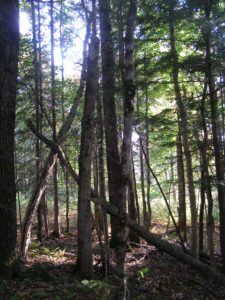
Die in my arms 09/27/17
Yesterday morning I went out to clear around an old shed we plan to put a foundation under and use. At one time there was an arbor along the south side of the building that supported a grapevine. The arbor is long gone now, and the sprawling grapevine is as thick as my wrist in some places and has spread over an area of about 50 square feet. I went to work, lopping saplings and woody growth and pruning the rest. The vine had produced some purple grapes as it crawled up the shed wall. I’ve never tasted a grape with such intense flavor, but there weren’t many. I wondered if we built a temporary trellis and I gave it some attention we might be able to take cuttings and save it. If it can survive years of neglect and still fruit, it seems to me it’s happy here.
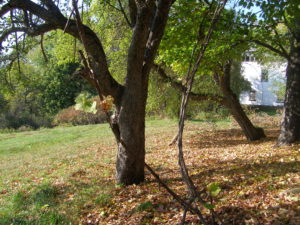
Apple and grapevine 09/27/17
I worked away until I came to the foot of an old apple. This tree is gnarled and twisted, as they often are, and the entire trunk is hollow from below eye level to my highest reach with several entrances and exits. This particular apple is early, and the fruit has mostly dropped and been eaten by wildlife. As I knelt under the tree, cutting back woody undergrowth, I looked up.
The grapevine, having no trellis to climb on, had over the years climbed the tree instead, and pounds and pounds of purple grapes hung down from the apple tree canopy, invisible unless you stand right under the tree.
Die in my arms, I thought, looking up in wonder. Live in my arms. Flourish, shelter and fruit in my arms.

Photo by Edu Lauton on Unsplash
Trees are not people. Clearly, people are not trees. We have demonized the continuum concept. We have civilized ourselves into cities of concrete and steel, hospitals, institutions and prisons. Touch in our culture is about rape, violence, abuse, capitalism and control. The need and desire to give and receive touch is viewed as inappropriate and dangerous. We’re addicts, homeless, outcast, broken, sick and lonely. We’re divided from one another, competitors and enemies. Few of us will die in anyone’s arms.
No, people are most certainly not trees.
All content on this site ©2017
Jennifer Rose
except where otherwise noted
by Jenny Rose | Sep 21, 2017 | Connection & Community, Emotional Intelligence, Holistic Management
Middle age is great fun. I’m constantly amused at how much time I spent during the first half of my life being ineffective. I’ve had heartfelt intentions, goals and plans and I’ve worked hard, but I’ve never understood a thing about simply letting life be. I know all about discipline and almost nothing about surrendering to the natural flow of anything, including myself.
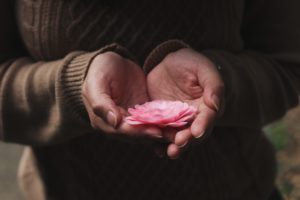
Photo by Ester Marie Doysabas on Unsplash
A few months ago I read an article about what makes plants happy. It was a revelation.
I call myself a gardener. During some periods I grew most of my own vegetables and herbs. It was a lot of work. In Colorado, water was always a problem, and in my rural gardens deer were a constant threat. Keeping a garden weeded, mulched and watered, along with raising two little boys, working, and running a household on a shoestring, was quite a challenge. I thought I knew a lot about gardening.
Here in Maine I don’t garden. We don’t have dedicated garden space protected from the deer, for one thing. For another, my diet has changed and I mostly eat meat now. I’m also older, my knees complain bitterly if I spend a lot of time kneeling, and my body does not want to bend over in a garden every day.
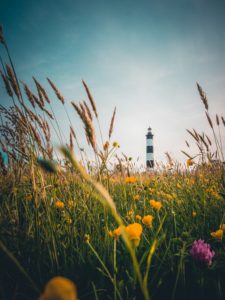
Photo by Louis Maniquet on Unsplash
On the other hand, we probably have thirty or more apple trees, wild raspberries (red and black), wild strawberries, highbush cranberries, blueberries, elderberries, roses, an ancient and persistent grapevine of unknown variety, sugar maples, pear trees and nut trees spread out across our land. The whole place is a garden.
We also have a short hedge of beach roses, thickly thorned and tough, running right along the road on the east side of the house. It gets the snowplow drifts of snow, ice and sand in the winter and the heat, exhaust and sometimes trash of every passing vehicle in the summer. I couldn’t kill them with an axe. It’s not a tall hedge, but it blooms pink in the spring and provides a small barrier between the house and the traffic. In this season it’s loaded with fat red round rose hips.
In the spring, we saw a lot of dead wood in the rose hedge and we began to give it a heavy pruning. It had been neglected for years, and I was certain it would come back, thicker and healthier than ever. It was miserable to work on because the thorns, though short, are numerous and tough, and defy the heaviest work gloves. We got about halfway through the task and then Spring caught us up, along with many other projects, and we never finished pruning the hedge. I raked up what we did take out, pitched the debris over a bank so the thorns were out of the way, and did nothing else for it. The denuded hedge looked spiky and ugly until it leafed out.
In the ensuing months I’ve watched that hedge bloom as usual with its bright pink flowers. One day I saw wild buttercup was also blooming in the places we’d pruned. Wild violets crept around the edges. Yellow hawkweed moved in. After the buttercups came white and yellow daisies. Then a froth of Queen Anne’s Lace draped around it, and tall purple clover beckoned the wild bees. As those faded, I recognized goldenrod and wild asters beginning to grow. Every couple of weeks my partner mows between the hedge and the house. That’s the only care and attention it ever gets.
Wildflowers have bloomed, each in their season, mingling with the roses, all summer and fall. Now there’s a foam of purple and white wild aster and the roses are blooming for a second time, mingling with hips. The hedge is a riot of color.
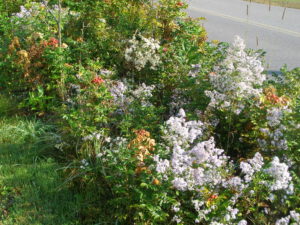
Beach rose hedge 09/17
This takes me back to the article I mentioned about what makes plants happy.
The article points out that plants grow in the wild according to their evolution, needs and contribution in a system. Some plants are tall and grow in isolation. Others are immensely social and form clumps or swathes. Some plants like to creep along the ground and grow low. Others are quite high and grow with tall grasses because they need the support of the surrounding stems. Look at a natural meadow or field in summer that hasn’t been grazed or recently mown, and you’ll see a system of plants and grasses growing together with no input from humans. There are no bare places that need to be mulched. Nobody comes along and dead heads and tidies things up. As flowers fade and plants die, or are fed on, vegetable matter and seeds fall to the ground and become food or sprout into the next generation of plants. The meadow or field, if healthy, will have a full complement of insects, birds and small rodents present, and so on, up the food chain.
Okay, you get the picture. Biology 101, right? But that’s not a garden.
A garden is where we prepare the ground by banishing “weeds;” amend, dig and turn the soil by exposing it and sterilizing it and wearing out our backs; spend money protecting the area with fences, animal repellents, insecticides and herbicides; buy bags and bags of expensive manure, peat, top soil and mulching materials; spend more money buying plants, often without particular regard to whether they’re native to our area and with no idea or interest in how they grow in the wild; and plant them in solitary confinement, carefully spacing them out in sad little oases amid the mulch. We do not give them appropriate companions or communities, allow them to build a family around themselves or allow them to make the contributions they were evolved to make to other plants and wildlife.
We hold gardens to our own standards of neatness, cleanliness, obedience and beauty. We cut and tidy away brown leaves and spent blossoms lest they offend the eye, never imagining we’re depriving our plants of the free food they were evolved to need. We plant to please our color and variety preferences, never asking ourselves or bothering to find out what those particular plants need in order to be happy. We never imagine ourselves a shrew, or a chipmunk, or a grasshopper, and it doesn’t occur to us to lie on the ground with our chins in the dirt and appreciate the complex layers of plant life covering it. The only view we consider is the one from above, and the only layer we see from that vantage point is the top one.
That’s what we call a garden. Isn’t it beautiful?
We humans have an incorrigible, idiotic kind of blind arrogance, myself included. I confess I never once thought about observing how Nature gardens and modeling my gardens on hers. Not once. Yet Earth has survived for millions of years, creating rich, self-sustaining forests, swamps, grasslands and other habitats without the interference of human beings. We don’t think about the plants’ point of view, though. We come along, wear out our bodies, spend money, try to reinvent elegant and sustainable life systems and wonder why gardens don’t thrive.
Duh.
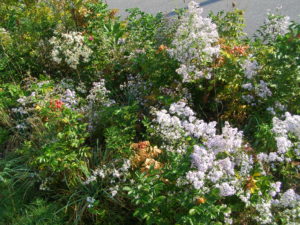
Beach rose hedge 09/17
I’ve been thinking about this article about what makes plants happy for months, and watching our little rose hedge. As we move into fall, I spend a certain amount of time pruning away dead wood and crowded saplings in many different places. We’ve cut a couple of old and dangerous trees. As I work, I carefully lay all the debris at the base of the plants I’m working on. I don’t uproot things. I don’t disturb the soil or the layer of wet rotting leaves on the forest floor. I cherish the sight of mushrooms growing everywhere, because I know they signal a healthy mycelium net underground, serving every plant and tree on the place and beyond. Apples and berries fall and rot where they lay, sinking back into the ever-richer earth. I notice how the wildflowers grow and spread and who they grow and bloom with. I’m making friends with the low ground-covering plants: Wild chamomile, wild strawberry, white clover, wild basil with its purple flowers, the sweet little violets and rabbit’s foot clover.
Unless in our way, we let trees lie as they fall and rot over time. We run the mower over autumn leaves and let them lie. We carefully stake volunteer or rodent-planted saplings to avoid mowing them, so the next generation of black walnut, maple, oak and beech can grow. We leave the tent caterpillars alone, because they provide food for birds, bears and other creatures.
I realize now all my neat gardening was driven by perfectionism, by a desire to feel in control, and by a need to please the eye of myself and others. I invested a lot of sweat equity in trying to garden “right” without ever questioning what that really meant. I made it much, much harder and more expensive than it ever needed to be.
It’s worth noting this is exactly the way I treat myself.
The rose hedge reanimated itself. It grows in the most inhospitable area of the whole place, but it knew just what to do. I stood back, let it alone and marveled.
You know what? I take it back. I’m not a gardener. But I do humbly enjoy a 26-acre garden.
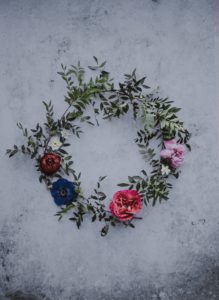
Photo by Annie Spratt on Unsplash
All content on this site ©2017
Jennifer Rose
except where otherwise noted
by Jenny Rose | Sep 14, 2017 | Connection & Community, Emotional Intelligence, Shadows
Power lies beneath the layers at the center, the heart, the core. All avenues of thought, all paths of inquiry lead back to power. What is it? Who controls it? How do we manage and maintain it? Power is the fuel of life. Every relationship is rooted in power. Managing our power is the key to managing our lives at every level, physical, emotional, creative, sexual, spiritual and intellectual.
Narcissists stalk emotional power. They seek it, they lust for it, their voracious hunger and need drive them to control it. They are a yawning abyss that can never be filled because they lack the ability to generate their own emotional power. They will never cease hunting for prey.

Photo by Rain Wu on Unsplash
The prey of the narcissist is carefully addicted and programmed with romance, charisma, and sex into becoming emotional power machines, set and calibrated to take full advantage of finely-gauged specifications of the prey’s need and vulnerability, so as to provide an unending stream of high-quality emotional power on which the narcissist gorges at will: The fine wine of our love, the exotic spices of our passion, the honey of our confusion, the refreshing tang of our jealousy, the nectar of our anguish and the bitter dark chocolate of our despair. Eagerly, we spread our longings, hopes, fears and fantasies before the icy coruscating mirror concealing the narcissist’s true nature. Narcissists manufacture networks of emotional power machines and pit us against one another in order to obtain ever more abundant, complex and complicated fuel. We are not released until we malfunction, and then we’re contemptuously eliminated (but not freed) to make room for a shiny new machine, and we languish until called for again.

Photo by Gary Bendig on Unsplash
The only hope of escape and healing lies in power, the center, the heart, the core beneath the layers. We must cease to hoard, deny, silence, or give away our emotional power. We must claim it, excavate it, call it by name, learn the flavor and scent of it. We must weep with it, rage with it, release it in righteous orgasm, create with it, fight with it. We must look through its unclouded eyes and follow it, wherever it takes us. We must pray with it, surrender to it and adore it. We must soar within its rapturous fiery wings and plunge into its healing green water. We must build a cosmos out of our emotional power and fill it with galaxies, adorn it with jeweled planets and sow it with shooting stars.
We must defend our emotional power with our lives, for without it we cannot live. We must seduce and enchant ourselves with the rapture of our own emotional power so we cannot be captivated by the scintillating mirrored eyes of the narcissist, for if we’re captured by those mirrors we’ll find nothing but our enslavement and performance as emotional power machines reflected back to us, and the stench of the charnel house will invade our souls.

Photo by Aimee Vogelsang on Unsplash
We must look in those glittering mirror eyes, look deeply, look well, and say, “Ah, here is my own reflection, my ravishing emotional self, entirely naked and unashamed.” We must say, “No, I will not be your emotional power machine, no, you can give me nothing that wasn’t already mine, no, I name you Narcissist and I know your terrible secret: You are powerless without your prey,” and turn away, dance away with our bountiful bared breasts and strong hips, pressing our lips to our own shoulders with love because we have everything we need, everything we want, as we embrace our own emotional power beneath the layers in our center, in our heart, in our core.
For more information on recognizing, understanding and managing narcissists and their behaviors, explore narcsite dot com, created and written by a narcissist. If you suspect you have had or now have a narcissist in your life, read ‘The Prime Aims’ on that site for clarification. If you are now or have been entangled with a narcissist, seek help and support immediately if you have not already done so. Your life is at risk.
All content on this site ©2017
Jennifer Rose
except where otherwise noted
by Jenny Rose | Sep 7, 2017 | Connection & Community, Emotional Intelligence
I read a blog post a few days ago titled ‘Romance Ruins Real Love’.
The post reminded me of a conversation I had with an old friend some years ago. She said her favorite part of relationship was the first weeks, when everything is romantic anticipation and excitement. I remember how violently I disagreed with that view, though I didn’t say so to my friend at the time.
I never trust romance, because I don’t equate it with love. Even as a child, I was suspicious of princes on white horses. As an adult, I want a relationship that survives the flu, a broken toilet, a week-long power outage, job loss, poverty, a car accident, a road trip, moving house and painting a room together. Anyone can dress up, buy flowers and make a reservation, given adequate time, money and motivation. Anyone can make love with words. Many can show up for a great night between the sheets. Most of life, however, consists of day-to-day challenges, tasks and unexpected stuff that no one can prepare for, and that’s when we find out what we’re made of, as well as what those around us are made of.

Photo by Jan Phoenix on Unsplash
In spite of all that, I hunger for romance in my life. I always have.
I realized this week I couldn’t come up with a succinct definition of romance. I could write lists of what I find romantic, sensual or sexy, but how do those categories overlap into a central core of what romance actually is? As I sat down to begin this post, I grabbed my Random House College Dictionary and was absolutely shocked at what I found.
Romance: A baseless, fanciful story; a love affair.
Wait, what? What about palpitating bosoms and muscled, shirtless heroes and wine and roses and diamonds? What about bikini waxes and lingerie, high heels, flowers, poetry, songs, movies and messages of love via social media? What about sex?
Is the whole world searching desperately for something that’s not even defined as real? I always thought it was real and attainable. I’ve thought of it as a rare phenomenon, a kind of shining miracle that can’t be bought or captured, coming only to certain remarkable, young, beautiful and deserving people.
I’m ashamed to want romance. It’s not for someone like me, someone flawed, broken, aging, unbeautiful and in many ways unlovable (another of my stories). To dream of romance, to yearn for it, is pitiable and pathetic, and I keep such dreams well hidden, releasing them only in my writing.
I notice all of these thoughts and feelings about romance, all the shame, futility and bitterness associated with one word that means a baseless, fanciful story. Wow.
I paused in writing this post and thought about Random House’s definition for a day. I decided the thing I find most disturbing about this definition is it’s purely subjective. Do we each have a unique baseless, fanciful ideal we’re searching for or trying to create? I’ve written about stories before. If my idea of romance is nothing but a baseless, fanciful story inside my head, it’s not about anybody else. It’s only about me. It’s not something I’ll ever discover out in the real world.
No wonder I haven’t been able to find it!
Huh.
If romance is just another of my stories, then it’s pointless to carry shame around because nobody will participate in my ideal. I’m the only one who can be responsible for my story. Nobody else even knows it, unless I tell it, and this is a private story I’m unwilling to reveal. My story of romance is part of who I am, a piece of vivid and passionate authenticity. It’s what I dance with and write with. I need it. It’s an aspect of myself to be nurtured and cherished, not ignored and denied.
Romance is not about them at all. It never has been. It’s about me.

Photo by Ryan Moreno on Unsplash
This is a place I’ve been before, although this time I’ve followed a different road to get here. When I lived alone in my own home in my old life, I became romantically self-reliant, as it were. I was lonely, but I realize now I was probably the most satisfied romantically I’ve ever been. I burned candles and incense. I bought flowers for myself. I took myself to the movies, to breakfast, out for pizza. I took long, luxurious baths with music and essential oils. I bought my favorite sexy underwear and wore it for my own enjoyment. I gave myself weekends away and night walks to watch the moonrise. I danced naked. I bought art cards I loved and mailed them to myself to mark special anniversaries and days.
Then I came to Maine and began life with my partner, and because I had a man in my life again, I gave up romancing myself. I realized my new relationship is deeper and stronger than romance. I no longer feel lonely. Many of my needs are being met now that have never been met before. Life in central Maine in a 100+-year-old falling-down and leaky farmhouse with very little money is not romantic, however, and my partner is a pragmatic Yankee. He’s about as romantic as a rock. He loves me. I don’t want him to be different, and I recognize he is not equipped to satisfy my hunger for romance.
Well, no. But given the above definition, is anyone? Has my search for romance been in vain because what I long for isn’t out there at all, it’s in here? Was it my responsibility all along?
I say again: Huh!
If I decide to be the best romantic partner I’ve ever had, is that hilarious or creepy?
One thing’s for sure. I won’t have to work very hard to be the best romantic partner I’ve ever had!
Wait, I already am the best romantic partner I ever had, I just took some time off. And now I miss me.
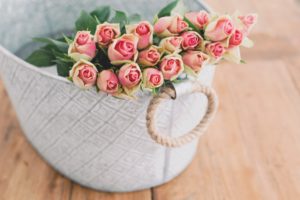
Photo by Roman Kraft on Unsplash
All content on this site ©2017
Jennifer Rose
except where otherwise noted
by Jenny Rose | Aug 31, 2017 | Connection & Community, Emotional Intelligence, Shadows
I’ve developed a practice of jotting down a list of events, conversations and observations at the end of every day, not only as a repository of creative prompts but also to identify patterns in my experience. During the last few weeks, perfectionism has appeared repeatedly in my daily lists, my own pursuit of it as well as my observation of it at work in others.
The first post I ever wrote was about people pleasing . As I draw word maps and play around with the idea of perfectionism, it’s impossible to separate it from people pleasing. They seem to be shackled together. When I think about that duality, it occurs to me perfectionism, like people pleasing, is a total abdication of power.
Trying to please others is always about someone else’s needs, and it’s always attached to a particular outcome I have no control over. Perfectionism feels the same way to me. It’s not about me. It’s not centered in my integrity or intention. I don’t even get to define what perfect is. It’s always about striving to meet the demands of others in order to obtain something I think I need from them.
Perfectionism is an old habit for me. I clearly remember trying to make beds perfectly, trying to sort laundry perfectly, trying to take care of my younger brother perfectly and trying to learn to tie my shoes perfectly. In fact, the entirety of my earliest memories are of struggling to be perfect in order to stay safe.
It didn’t work.
The problem with the concept of perfection is that it’s a chimera, something desperately hoped or wished for but impossible to achieve. Perfection is not static. It’s as elusive as a dust mote dancing in a shaft of light. The second we try to capture, control or define it, it vanishes.
When I imagine a perfect lover, a perfect friend, a perfect house or a perfect day, what I’ve done is pin the butterfly of perfection into a velvet-lined case. In the effort to preserve it, I’ve killed it. To describe perfection as always winning, unchanging, uncomplicated or in any other terms is to limit it, and, diminished, it crumbles into dust.

Photo by Austin Ban on Unsplash
My best view of perfection is always over my shoulder. Perfection defies my expectation and agenda, but I glimpse it clearly as it passes by me and dances away in the distance. Whatever has been; that was perfect. Whatever is now is perfect. All the nows of my life, strung together like pearls on a silk thread, rippling behind me in the current of my passage, are perfect, including, and maybe especially, the knotted repairs, the frayed silk, and the variations in colors, shapes and sizes of the nows.
Perfection is nothing more than a frame. If perfection means without flaw, what is a flaw, exactly? That’s subjective, too. A flaw is just another frame. Either perfection or flaw can frame a moment, a day, a life.

Photo by Nathan Dumlao on Unsplash
I’m the only one with the power to define what perfect means in my life. I don’t have to buy in to anyone else’s interpretation. A perfect score, a perfect grade, a perfect 10, a perfect record, a perfect job, a perfect gift and all the rest are powered by competition and outcomes. Even if I win or achieve the outcome I desire most, that moment of perfection is fleeting, a brief second of shimmering wings, and then the butterfly of perfection has once again flown and the current of my life sweeps me into new territory.
Perfectionism, for me, is a compulsion and an addiction. It seduces me with promises of feeling valued and loved, but it never delivers. Practicing perfectionism is practicing self-hatred and fueling my internal critic until I’m paralyzed and beaten. Perfectionism renders me anxious and powerless. I still find myself in its grip occasionally, but I recognize the taste of it now. It’s the taste of futility, of exhaustion and unending effort. It’s empty and barren.
Those who hold us to their standards of perfection are not loving us. They’re controlling us, and people who control others do so because they cannot control themselves. Their expectations of perfection are about them, not us. There is no love there, no success, no safe harbor. Requiring perfection from ourselves murders our ability to live authentically, freely and fully.
My youngest son, wise beyond his years, used to say to me, “Mom, perfection is not a goal.” In those days, the pursuit of perfection still had me by the scruff of the neck and pleasing people was the only hope I had for earning love.
Now I’m older and feistier and I don’t want the pretense of love I have to earn. Perfection doesn’t interest me. I can do much more than achieve perfection. It’s not deep enough, not wide enough and not juicy enough. The false promise of perfection contains nothing I want or need. I want clouds of goldenrod and fields of butterflies and a long necklace of nows I collect, string and knot into place, one perfect pearl at a time.

Photo by Kelly Sikkema on Unsplash
All content on this site ©2017
Jennifer Rose
except where otherwise noted




















